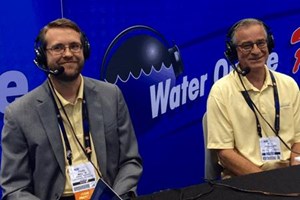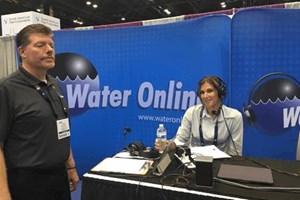WATER TALK

Rugged Computing For The Water Utility
For a long time, rugged devices have been used for specific purposes in the field by operators. With the release of Windows 10 however, Juniper Systems is arming operators with handhelds that are more akin to mobile computers than single parameter data loggers.
Continue Reading..

Ozone Disinfection For Water Reuse
According to Jim Jackson, Director of Municipal Sales for Mazzei Injector Company, we’re a few years away from direct potable reuse, often referred to as “toilet to tap.” However, Jackson is seeing a growing reuse of water in supplementing feed waters to reservoirs, using membrane filtration, UV, multi-media filtration and ozone to purify this water.
Continue Reading..
Layering Water Data From Disparate Systems Creates Clear View Of Assets
Most water professionals are not first-and-foremost IT people, but they do understand the critically important task of keeping their SCADA and other computer systems secure. One of the most critical considerations in doing this is linking disparate systems developed over time together.
Continue Reading..

Partial Shutoff For Partial Service
Cutting off service to a customer who hasn’t paid their water bill can be a controversial move for many utilities. But a new product that integrates a shut off valve with an ultrasonic meter may make what has traditionally been an all or nothing decision a little easier.
Continue Reading..

Technologies For Detecting Water Loss
As water loss continues to concern many utilities, American Leak Detection’s franchise business model continues to “plug many a hole.” As Adam Gray, Director of Marketing for American Leak Detection, explains in this Water Online Radio interview, the franchise model is effective on numerous levels, whether it be providing the leak detection expertise that a utility doesn’t necessarily have on staff or allowing leak...
Continue Reading..

Upgrading Filtration In Your Water Treatment Plant
As utilities grapple to do more with less, many manufacturers are creating novel retrofit products that can work within the current footprint of a treatment facility.
Continue Reading..

Biological Filtration For Drinking Water Treatment Takes Off
Biottta is a relatively new biological filtration process for drinking water treatment, addressing nitrates, perchlorates, chromium-6 and a number of VOCs as well. In this Water Online Radio interview, AdEdge Water Technologies’ Chad Miller and Rich Cavagnaro discuss its emergence in the water treatment market and some of the specific contaminants it addresses.
Continue Reading..
Activated Carbon And Ion Exchange Resins Compared
Andy McClure and Jim Knepper of Jacobi Carbon recently sat down with Water Online Radio to discuss the differences between activated carbon and ion exchange resins as mediums for water purification. The interview covered recent developments such as the lowering of the EPA’s health advisory level for perflourinated compounds and cyanotoxins from algal blooms to the more traditional concerns of taste, odor, disinfection byproducts and TOC...
Continue Reading..

Coconut Shell Activated Carbon For Removing PFOA And PFOS
Coconut shell activated carbon is typically used for filtration in cleaner waters. Its alternatives are coal-based or wood-based carbon. With the recently published EPA guidelines on perfluorinated compounds, Water Online Radio sat down with Neal Megonnell, Senior Vice President for Haycarb USA, to understand coconut shell activated carbon’s application in fighting PFOA and PFOS.
Continue Reading..

Filters For Corrosive Environments
Forsta Filters designs and fabricates automatic self-cleaning water filters. Polly Stenberg, Director of Sales for the Los Angeles, CA-based company, recently sat down with Water Online Radio to discuss the Company’s fiberglass reinforced plastic (FRP) series. As Stenberg explains, the filters answer an increasing need for equipment to handle corrosive environments, predominantly brackish, brine and seawater.
Continue Reading..
